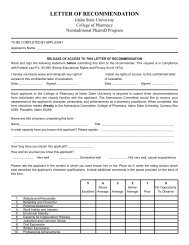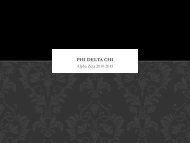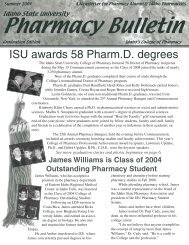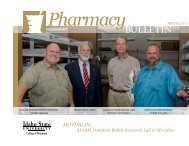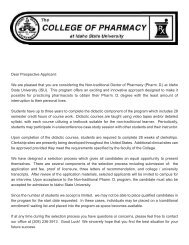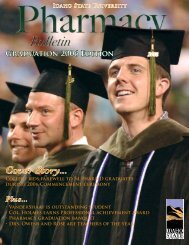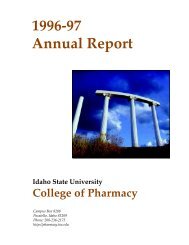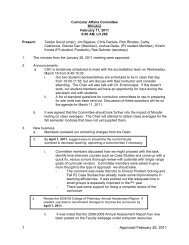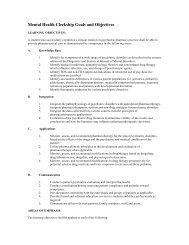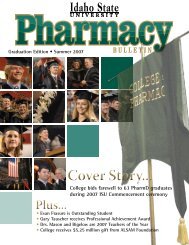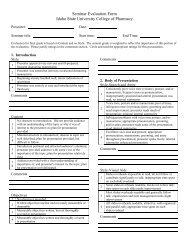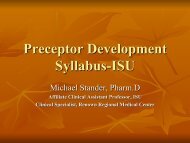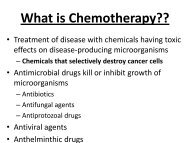By Franklin R. Cole, Ph.D. - College of Pharmacy - Idaho State ...
By Franklin R. Cole, Ph.D. - College of Pharmacy - Idaho State ...
By Franklin R. Cole, Ph.D. - College of Pharmacy - Idaho State ...
Create successful ePaper yourself
Turn your PDF publications into a flip-book with our unique Google optimized e-Paper software.
Petitions<br />
A petition is utilized to make a written request<br />
to deviate from institutional policy<br />
and/or other needed purposes. Petitions are<br />
commonly used for general education requirements,<br />
university requirements, departmental<br />
and/or college requirements, readmission,<br />
challenge by examination, and late<br />
registration.<br />
Americans with<br />
Disabilities Act (ADA)<br />
Resource Center<br />
Services are individually designed and provided<br />
for all qualifying (self-identified) persons<br />
with disabilities. Services include, but<br />
are not limited to, reading, interpreting, electronic<br />
communication devices, large print<br />
texts, recorded tests, tape transcription, note<br />
taker supplies, quiet testing areas, and additional<br />
time for taking tests. Contact Dennis<br />
Toney, Director, ADA & Disabilities Resource<br />
Center, ground floor, Graveley Hall, 282-3599.<br />
Dean’s List<br />
The <strong>College</strong> <strong>of</strong> <strong>Ph</strong>armacy Dean’s List is comprised<br />
<strong>of</strong> the top 15% <strong>of</strong> each class including<br />
prepharmacy and pr<strong>of</strong>essional <strong>Ph</strong>arm.D. students<br />
calculated each fall and spring semesters.<br />
Student Conduct<br />
Academic Dishonesty<br />
[ISU Faculty and Staff Handbook, Part 6, section IX]<br />
A. Academic Dishonesty<br />
1. General<br />
a. Academic integrity is expected <strong>of</strong> all individuals<br />
in academe. Behavior beyond reproach<br />
must be the norm. Academic dishonesty in<br />
any form is unacceptable.<br />
b. Academic dishonesty includes, but is not<br />
limited to, cheating and plagiarism.<br />
2. Definitions<br />
a. CHEATING is defined as the act <strong>of</strong> using or<br />
attempting to use, in examination(s) or other<br />
academic work, material, information, or<br />
study aids which are not permitted by the instructor.<br />
Examples <strong>of</strong> cheating include, but are not limited<br />
to:<br />
(1) Obtaining, providing or using unauthorized<br />
information during an examination, verbally,<br />
or visually, or by notes, books, or other<br />
materials.<br />
(2) Acquiring, possessing, or providing to others,<br />
examinations or other course materials<br />
without authorization <strong>of</strong> the instructor. This is<br />
understood to include providing information<br />
about an examination in advance <strong>of</strong> the<br />
scheduled administration <strong>of</strong> that examination.<br />
(3) Taking an examination for another person<br />
or arranging for someone else to take an examination<br />
for you.<br />
(4) Submitting for course credit; the same<br />
work or substantial portions <strong>of</strong> the same work<br />
in two different classes without prior approval<br />
<strong>of</strong> the instructor(s).<br />
(5) Fabricating information without the permission<br />
<strong>of</strong> the instructor for any report or<br />
other academic exercise.<br />
b. PLAGIARISM is defined as representing<br />
another person’s words, ideas, data or work as<br />
one’s own. Plagiarism includes, but is not limited<br />
to, the exact duplication <strong>of</strong> another’s work<br />
and the incorporation <strong>of</strong> a substantial or essential<br />
portion there<strong>of</strong> without appropriate<br />
citation. Other examples <strong>of</strong> plagiarism are the<br />
acts <strong>of</strong> appropriating the creative works in<br />
such fields as art, music and technology, or<br />
portions there<strong>of</strong>, and presenting them as one’s<br />
own.<br />
The guiding principle is that all work submitted<br />
must be properly credited to the original<br />
source(s) <strong>of</strong> the information. In written work,<br />
direct quotations, statements which are paraphrased,<br />
summarizations <strong>of</strong> the work <strong>of</strong> another<br />
and other information which is not considered<br />
common knowledge must be cited or<br />
2006 <strong>College</strong> <strong>of</strong> <strong>Ph</strong>armacy Student Handbook 14



